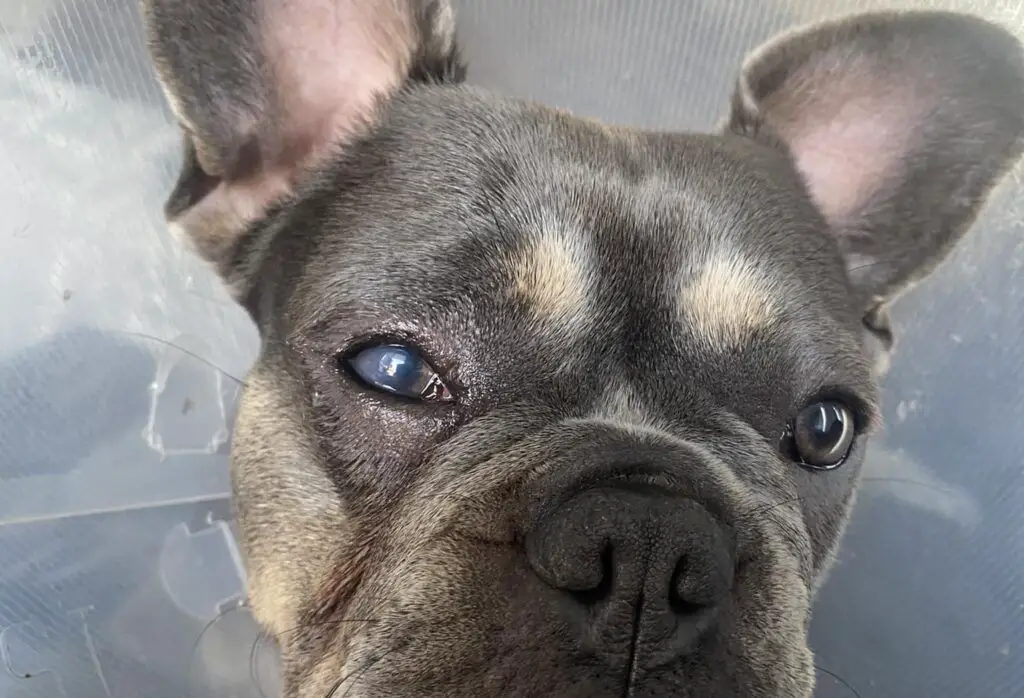Dog eye ulcers, or corneal ulcers, are a concerning health issue that can cause significant discomfort and even vision impairment for your beloved canine companion.
As pet owners, it’s crucial to understand the nature of this condition and whether it poses any risk to other animals.
In this article, we will delve into the causes of dog eye ulcers, examine their potential for contagion, and offer essential guidance on safeguarding your pet’s ocular health while preventing the transmission of infections to other pets.
- Key Takeaway
- What is Eye Ulcer in Dogs?
- Are Dog Eye Ulcers Contagious?
- Are Corneal Ulcers in Dogs Serious?
- What Is The Cost of Treating Corneal Ulcers?
- Is There a Vaccine For Corneal Ulcers in Dogs?
- FAQs
- Q: Are corneal ulcers in dogs contagious?
- Q: What is a corneal ulcer in dogs?
- Q: What are the causes of corneal ulcers in dogs?
- Q: What are the signs and symptoms of corneal ulcers in dogs?
- Q: How are corneal ulcers in dogs diagnosed?
- Q: What is the treatment for corneal ulcers in dogs?
- Q: Can corneal ulcers in dogs heal on their own?
- Q: What is an indolent ulcer in dogs?
- Q: When should I take my dog to a veterinary ophthalmologist for corneal ulcers?
- Q: How can I prevent corneal ulcers in my dog?
- In Conclusion
Key Takeaway
| Key Takeaway | Description |
|---|---|
| Eye Ulcer in Dogs | A corneal ulcer is damage to the cornea, resulting in pain, inflammation, and discharge. Treatment depends on the severity and may include medications or surgery. |
| Contagiousness | Dog eye ulcers themselves are not contagious, but underlying infections causing them may be contagious and spread between animals. |
| The seriousness of Corneal Ulcers | If left untreated, corneal ulcers can lead to complications such as infection, perforation, scarring, and vision loss. Prompt treatment is crucial. |
| Prevention | Monitor your dog’s eye health, minimize exposure to irritants, and treat underlying eye conditions promptly to prevent corneal ulcers. |
What is Eye Ulcer in Dogs?

Eye ulcer in dogs is a type of eye infection, usually caused by bacterial or fungal organisms.
The condition can occur in any breed, but certain breeds, such as Toy Poodles and Cocker Spaniels, are more prone to the disease.
An eye ulcer results from damage to the surface of the cornea that exposes its sensitive tissue underneath.
This delicate layer becomes infected easily leading to pain, inflammation, and discharge.
Treatment for an eye ulcer depends on the severity of the infection and may include antibiotics or antifungal medications.
Surgery may be needed in some cases if there is severe damage to the cornea. Proper diagnosis and treatment are important to ensure full recovery and prevent permanent vision loss.
Are Dog Eye Ulcers Contagious?

No. Dog eye ulcers are not contagious and cannot be passed from one animal to another. However, the underlying cause of the ulcer may be contagious.
For example, if a dog’s eye ulcer is caused by an infection, then that infection may be contagious and spread to other animals.
Corneal ulcers in dogs can have many causes, including trauma, foreign body injury, chemical burns, eyelid abnormalities such as entropion or ectopic cilia, irritants such as soaps and alcohol, and infections.
Treatment for dog eye ulcers depends on the underlying cause and may include antibiotics or antiviral medications for infections, topical ointments or drops for irritants or abrasions, surgery to correct eyelid abnormalities or removal of foreign bodies.
Are Corneal Ulcers in Dogs Serious?
Corneal ulcers in dogs can be serious if left untreated. A corneal ulcer is a wound or abrasion on the cornea, which is the clear, front surface of the eye. It occurs when inflammation of the cornea causes an open sore to form. If left untreated, it can lead to permanent damage to the eye and even blindness.
The most common symptoms of a corneal ulcer are squinting redness and ocular discharge. Ulcers are typically painful, and the animal will squint, blink frequently and have a watery discharge from the affected eye. It’s important to take your dog to the vet as soon as you notice any of these symptoms so that they can diagnose and treat it quickly.
Treatment for corneal ulcers depends on what caused them in the first place. Common treatments include antibiotics to fight infection, anti-inflammatory medications to reduce swelling, and pain relief medications.
In some cases, surgery may be needed to remove damaged tissue or repair eyelids that are not properly functioning.
What Is The Cost of Treating Corneal Ulcers?
Generally, treatment for eye ulcers costs ranges from $100 for over-the-counter eye drops to $10,000 or more for surgical procedures and long-term treatments.
For a simple keratectomy, which is used to treat smaller dogs with little conflict, the cost can be as low as $200.
A superficial keratectomy, considered to be a much more complex procedure, may cost between $500 and $2500.
In some cases, pet eye surgery treatment can cost between $1,500 and $1,900 depending on the severity of the condition and whether one or both eyes are involved.
It is important to note that corneal debridement in dogs may also be necessary and this procedure can cost between $200 and $500 depending on factors such as locality, age of the dog, and severity of their condition.
Overall, it is best to consult with your veterinarian to determine the best course of action for treating your pet’s corneal ulcer and what costs you should expect.
Is There a Vaccine For Corneal Ulcers in Dogs?
No, there is currently no vaccine for corneal ulcers in dogs. Corneal ulcers are painful and can cause serious complications if not treated promptly.
They are usually caused by trauma or infection and can be prevented by monitoring pets during play and exercise to reduce the risk of trauma to the eye.
Treatment typically involves antibiotics, tetracyclines, atropine, and other medications that are toxic to the cornea but safe for one-time use when used with caution.
FAQs
Q: Are corneal ulcers in dogs contagious?
A: No, corneal ulcers in dogs are not contagious. They are caused by a variety of factors such as bacterial infections, physical trauma, or underlying eye conditions.
Q: What is a corneal ulcer in dogs?
A: A corneal ulcer is an open sore or lesion that forms on the cornea, which is the clear outermost layer of the eye. It can be a superficial or deep ulcer and can cause discomfort and pain for the dog.
Q: What are the causes of corneal ulcers in dogs?
A: There are several causes of corneal ulcers in dogs, including bacterial infections, physical trauma, underlying eye conditions such as dry eye or indolent ulcers, and exposure to environmental irritants like chemicals or foreign objects.
Q: What are the signs and symptoms of corneal ulcers in dogs?
A: The signs and symptoms of corneal ulcers in dogs may include excessive blinking, squinting, redness, swelling, discharge, and sensitivity to light. The dog may also paw at their eye or rub their face against surfaces to alleviate the discomfort.
Q: How are corneal ulcers in dogs diagnosed?
A: A veterinarian will perform a thorough eye examination and may use special dyes to highlight the presence of an ulcer. They may also take a sample of any discharge or debris for analysis to determine the underlying cause of the ulcer.
Q: What is the treatment for corneal ulcers in dogs?
A: Treatment options for corneal ulcers in dogs may include topical or oral antibiotics, pain medication, and eye drops to promote healing. In some cases, surgery may be necessary to remove any underlying foreign bodies or to facilitate healing.
Q: Can corneal ulcers in dogs heal on their own?
A: Superficial corneal ulcers in dogs may heal on their own within a few days to weeks. However, deep or non-healing ulcers may require more aggressive treatment to prevent further damage to the eye.
Q: What is an indolent ulcer in dogs?
A: An indolent ulcer in dogs is a type of non-healing corneal ulcer that occurs when the outermost layer of the cornea, known as the epithelium, fails to adhere properly to the underlying layers. It is a common cause of chronic corneal ulceration in dogs and can be difficult to treat.
Q: When should I take my dog to a veterinary ophthalmologist for corneal ulcers?
A: It is recommended to consult with a veterinary ophthalmologist for corneal ulcers in dogs that are deep, non-healing, or recurrent. They have specialized training and equipment to accurately diagnose and treat eye conditions in pets.
Q: How can I prevent corneal ulcers in my dog?
A: You can prevent corneal ulcers in your dog by minimizing their exposure to potential eye irritants such as chemicals or foreign objects, providing regular eye care such as cleaning and grooming, and treating any underlying eye conditions promptly.
In Conclusion
Dog eye ulcers can be a distressing and painful condition for your canine companion. While corneal ulcers themselves are not contagious, the underlying infections that may contribute to their development can potentially spread between dogs.
As a responsible pet owner, it is essential to monitor your dog’s eye health and seek veterinary care if you notice any signs of a corneal ulcer.
Early intervention and appropriate treatment can help prevent complications, protect your dog’s vision, and ensure the well-being of both your pet and other animals they may come into contact with.





Leave a Reply